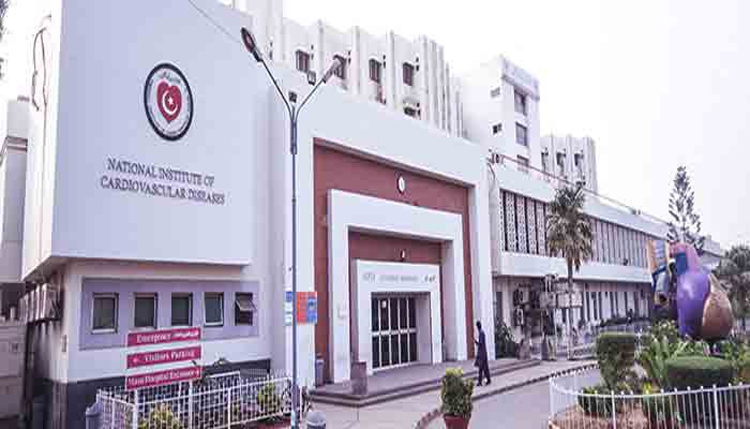Sindh gets health institutes back
Faced with an acute shortage of financial resources and fiscal space, the federal government has decided in principle to hand over administrative and financial control of three hospitals in Karachi and one in Lahore to the respective provincial governments. This was announced on Saturday by Ministry of National Health Services, Regulation and Control.
Federal Ministry of National Health Services, Regulation, and Control had assumed the administrative control of three major Karachi hospitals that included National Institute of Cardiovascular Diseases; Jinnah Postgraduate Medical Centre and National Institute of Child Health, Karachi, as well as Shaikh Zayed Medical Institute, Lahore, in May this year, following the directives from Supreme Court of Pakistan. Yet, no monetary allocation was made in the financial budget for these hospitals.
Special Assistant to Prime Minister on Health Dr Zafar Mirza said that the federal cabinet, in its last meeting, had discussed the issue of provincial hospitals in detail and decided to hand over these facilities to Sindh and Punjab governments.


The Attorney General of Pakistan would soon approach the Supreme Court of Pakistan and urge the Apex court to review its decision regarding these four health facilities.
On January 16, 2019, the Supreme Court of Pakistan declared Jinnah Post Graduate Medical Centre (JPMC). National Institute of Cardio Vascular Diseases (NICVD) National Institute of Child Health (NICH), Shaikh Zaid Medical Complex Lahore (SZMC) and National Museum of Pakistan, Karachi (NMP) a part of the federal government. It called their devolution to provinces unconstitutional, without lawful authority, and of no legal effect and all the orders, directions issued having also no legal status.
The court had given 90 days to provincial and federal governments for a smooth transition of the hospitals’ control. The deadline given by the court ended in mid-April.
Sindh government had also filed a review petition in the Supreme Court; seeking the reversal of the court’s verdict and permission to run the hospitals.
Sindh is getting well-organized, free-of-cost benefits from NICVD
The provincial government and the health institutions had approached the court with a claim that since the subject of health had been devolved to provinces under the 18th Amendment, the management of the JPMC, NICVD and NICH also vested with the Sindh government.
The apex court had rejected the Sindh government’s plea in January.
Sindh Government had already opted for these institutes and was reluctant to back the federal government.
Ruling out any deal with Pakistan People’s Party (PPP) in this regard, Federal Health Advisor maintained that this decision was taken in order to save people of Sindh from problems and difficulties.
The federal government was facing financial issues. Thus, it was difficult for them to run these health facilities in the prevailing economic situation. Yet, he added that financial issues were not the only consideration while taking a decision regarding these facilities.
On the other hand, Sindh Advisor Information Barrister Murtaza Wahab welcomed the federal cabinet’s decision and said they already knew that the federal government lacked the capacity to run such huge and specialized health facilities.
Advising federal government to refrain from interference in the provincial governments’ affairs, he said that the federal government should concentrate on improving its performance and fulfilling its promises with the people of Pakistan.
Earlier, PPP chairman Bilawal Bhutto Zardari showed strong reservations against the federal government’s takeover of three major hospitals of Sindh as a blatant attack on the provincial autonomy.
The happiest day for the consultant working in JPMC and NICH was when he was promoted from BPS-18 to BPS-21 by Jinnah Sindh Medical University (JSMU) under the control of Sindh Government. Presently, they are in line for two years from the Sindh Health Department. They all have promotions of higher ranks with attachment to JSMU.
Similarly, NICVD has appointed many consultants and has a very big network in the field of cardiology, free-of-cost, with the financial support of the Sindh government.
Presently, JPMC is well established with a necessary emergency system, a cyber knife for cancer patients. It is Asia’s top free-of-cost and well-established radiology department.
NICVD caters to the cardiovascular needs of a vast majority of patients from all over Pakistan as well as patients from neighbouring countries. It is responsible for training the bulk of local cardiac physicians, nurses, and paramedics across the country.
Besides Chest Pain Units, nine Satellite Centers were also working free of cost at Civil Hospital Larkana, Sehwan, Tando Muhammad Khan, Sukkur, Khairpur, Nawabshah, Mithi, Ghotki, and Hyderabad. They are now working with the full support of the Sindh government. Sindh is getting well-organized, free-of-cost benefits from NICVD.
The NICVD now has a very vast network free of cost in the province of Sindh by getting a budget worth billions from Sindh government. Poor people are really praying and credit goes to PPP and the Government Sindh.
The writer is a retired doctor of the Sindh Health Department
Leave a Comment